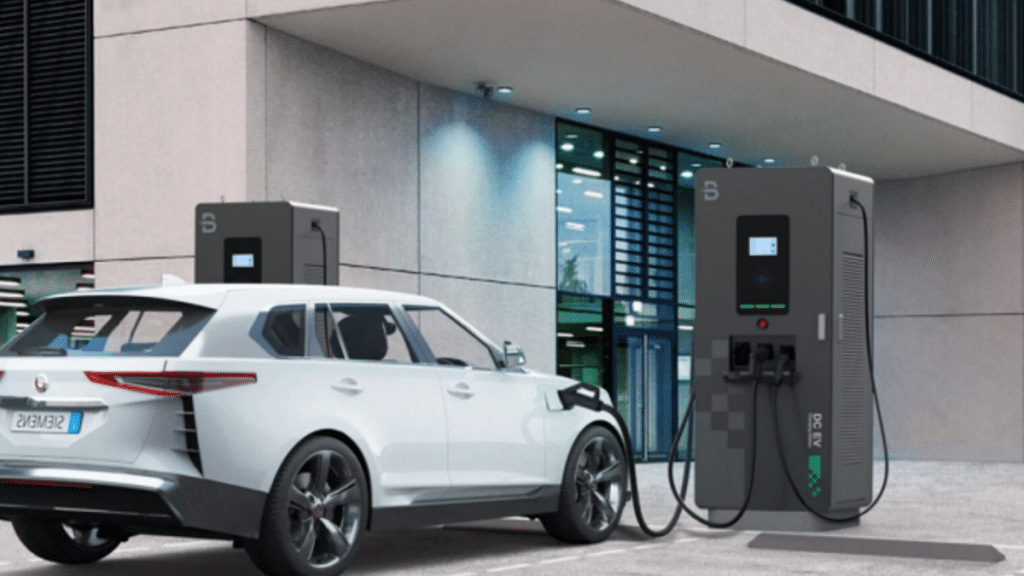With the reduction of fossil fuels and the deterioration of environmental pollution, governments worldwide have actively started encouraging the use of electric vehicles (EVs) to reduce transportation carbon emissions. Because of favorable policies and rising green consciousness, the global electric vehicle market has risen exponentially in the past few years and is expected to continue rising sharply in the coming decade. This rapid increase in EV users has led to an increasing need for charging infrastructure development.
More efficient and conveniently located commercial EV charger solutions are needed to meet the demand, especially in areas where people spend a significant portion of their everyday lives and activities, such as workplaces, shopping centers, restaurants, etc. Developing sufficient fast charging solutions for commercial use will be crucial to further accelerate the mass adoption of electric vehicles and make electronic mobility a common reality.
Types of Commercial EV Chargers
With the EV market growing rapidly, having access to reliable charging options has become crucial for both commercial areas and EV drivers. There are two primary types of commercial EV chargers available: AC EV chargers and DC EV chargers. These different charging solutions serve different purposes, depending on factors such as the location, time drivers spend at a location, and desired charge time.
Both AC and DC chargers have pros and cons considering the application scenario. Understanding these differences is key in determining the optimal charger types for a given commercial setting and drivers’ needs.
1. AC EV Charger
AC chargers leverage alternating current for efficient though comparatively slower charging. The AC current output from the AC charging station is converted into direct current through the on-board charger. Their cost-effectiveness is underscored by a basic design, rendering installation more affordable. With lower grid capacity requirements, AC chargers seamlessly integrate into residential settings. Key aspects of AC EV chargers include:
- Power ratings typically range from 7.4 kW to 22 kW.
- Need to use an on-board charger to assist charging.
- Allow for slower but stable and efficient charging times.
- Generally cheaper to install due to a more basic design than DC EV chargers.
- A practical solution for applications that do not require rapid charging. Best suited for locations where vehicles remain parked for extended periods, e.g., community parking lots where EVs can charge for over 8 hours.
2. DC EV Charger
DC EV chargers have much higher power capacity. It can directly provide DC current for the power battery of electric vehicles without an on-board charger. As the name implies, DC EV chargers can charge an electric vehicle much faster through direct current power. Key aspects of this type of commercial EV charger include:
- Have much higher power capacities from 20 kW up to 262 kW or above.
- Can charge an EV much faster through direct current power.
- Provide a quick charge boost within a short time.
- Some models allow drivers to add 100 miles of range in just 10-30 minutes, such as Beny’s floor-mounted 3 guns DC EV charger.
- Advanced technology makes them the recommended choice for commercial use cases that demand fast charging throughout the day.
- More suitable for application in public spaces, e.g., shopping centers, restaurants, freeways, and gas stations where drivers require faster charging options.
- Require advanced direct current technology and protection mechanisms.
Advantages of High-quality Commercial EV Chargers
As the global EV market continues to grow significantly each year, the need for reliable and convenient public charging infrastructure is becoming increasingly important. High-quality commercial EV charger solutions have risen to satisfy this demand, offering versatile solutions that benefit both drivers and installation sites.
The best commercial EV charging stations offer several key advantages that have led to their increasing popularity among EV drivers and installation sites. Their advanced features empower businesses while supporting the widespread adoption of electric vehicles:
1. Fast Charging Speed
A core advantage of premium commercial EV chargers is their ability to provide ultra-fast charging. The direct current from the DC charger allows rapid battery replenishment, hence alleviating range anxiety. This speed enables convenient charging sessions during brief stops.
For example, an 82kW charger like Beny’s Floor-mounted 3 Guns DC EV Charger allows adding 74 mileage during a 10-minute shopping trip. The function of allowing multiple cars to charge simultaneously also maximizes asset usage. For instance, some EV charger stations can serve 3 vehicles, whereas a slower commercial EV charger might fully charge just one over the same period. Rapid charging options, therefore, further encourage broader EV adoption and improve the convenience and flexibility of electric vehicle charging.
2. Compatible with Various Car Models
As the EV market diversifies, ensuring compatibility with different automakers is important. Premium commercial chargers can usually support various brands and models. This provides future-oriented infrastructure investments for the growing mainstream electric vehicle market. As new automakers enter the electric vehicle space, having universal commercial EV charger standards like CCS and CHAdeMO can eliminate the risk of incompatible chargers and customer confusion.
In this way, drivers are assured that public fast chargers can fuel any electric vehicle they purchase, regardless of manufacturer or model. Broad compatibility standards foster continued EV adoption by removing technology barriers at the charging service point.
3. Intelligent Charging
Advanced commercial chargers feature intelligent OCPP 1.6J protocols that optimize power distribution and charging efficiency. Smart app control, for instance, allows users to view real-time status and historical statistics anytime, anywhere. Compared to simple commercial charging stations, optimized products can increase energy transfer efficiency and adjust the optimal settings. In this way, more kilowatt-hours are delivered during each charging using the same charging hardware.
In addition to this, the smart capabilities ultimately lower operating costs while enhancing customer experience through faster, effective charging.
4. Safety and Durability
Reliability and safety remain top priorities for fostering general EV adoption. High-quality commercial EV charger solutions are engineered to withstand harsh outdoor environments year-round. Chargers need to meet minimum IP55 standards and have a robust shell for complete weatherproof protection. Durable powder-coated steel enclosures protect internal components against wide temperature variability and damage from dirt, water, and impacts.
Commercial charging stations should also be equipped with various protection mechanisms, such as leakage protection, over-voltage, and over-current protection, to avoid damage to the vehicle during charging. Commercial EV chargers nowadays also feature vandal-resistant designs that discourage tampering or theft. Rigorous testing and certification can ensure stable and hazard-free operation even in demanding public applications.
5. User Friendly Design
Well-designed commercial EV chargers ensure accessibility and a convenient charging experience. Products that are equipped with user-friendly and intuitive interfaces can guide drivers step-by-step to charge and check the charging status. Bright touchscreen displays provide simple yet powerful display features.
Apart from this, commercial EV charger solutions these days support supplementary mobile apps that execute vital charging functions remotely. Smart connectivity is very beneficial as it enables timely notifications, payment processing, and remote monitoring/management by users.
Through a user-centric design, renowned commercial EV charger manufacturers have simplified the charging process, making it as intuitive as refueling traditional cars. Their products embrace evolving charging standards and software to remain compatible with the latest vehicle technologies. This fosters relationship-building with EV drivers by ensuring a dependable, future-proof charging experience.
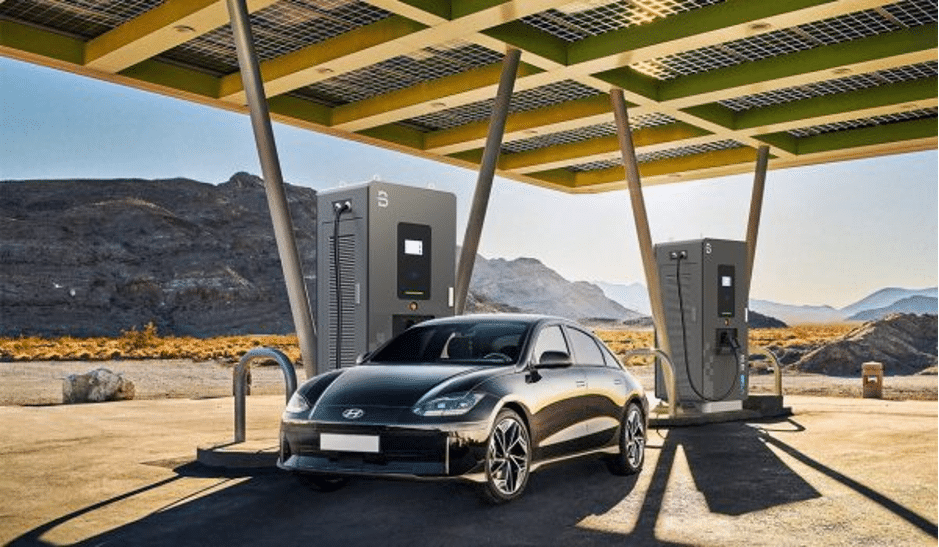
Application Scenarios of Commercial EV Chargers
As EVs continue to grow in popularity, commercial EV charging infrastructure is playing a critical role in accelerating sustainable transportation. Versatile, high-quality chargers can be seen at workplaces, retail centers, entertainment venues, and other common community locations. Common application scenarios of commercial EV chargers include the following:
1. Workplace
The workplace is one of the most important scenarios that needs commercial EV charging infrastructure. Installing chargers in employee parking lots and garages provides EV drivers with convenient options to top up their vehicles every day before departing for home. This ease of refueling removes worries that could otherwise dissuade commuters from choosing electric vehicles.
Over time, supporting the adoption of EVs helps lower the company’s carbon footprint directly. Convenient workplace charging also demonstrates corporate social responsibility while attracting and retaining talent by enhancing EV viability as a daily transportation choice.
2. Shopping Centers
Installing high-powered DC commercial EV chargers near primary entrances or other high-traffic locations in retail can positively impact consumer behavior.
EV drivers who can accept a convenient 30-minute fast charging session are far more likely to linger near stores, dining options, or on-site services instead of immediately departing once their vehicle is ‘refueled.’ This extends average customer dwell times, hence offering opportunities for retailers to leverage those extra minutes spent on consumption.
3. Hotels and Restaurants
For hospitality seeking competitive advantages, offering EV charging stations represents an innovative service that strengthens bonds with EV drivers. Beyond serving the needs of those traveling via electric vehicles, a reliable commercial EV charger solution also serves as a value-added perk that differentiates the service experience.
It enhances user experience as EV drivers grow more inclined to choose hotels or restaurants with convenient refueling stations. EV drivers are more likely to return because their transportation needs will seamlessly sync with lodging or dining visits.
4. Activity Venues
Extending application scenarios include activity venues like stadiums, concert halls, etc. Offering an on-site commercial EV charger solution serves as a unique amenity that gives customers the convenience of using EVs during outings. This helps to increase the usage rate of these places and create a user-friendly experience.
EV charging strengthens location attractiveness since drivers may specifically choose venues that advertise convenient refueling on parking lots. As urban mobility hubs evolve, the ability to charge the vehicle quickly bolsters repeat visits and a positive establishment image.
5. Social Service Areas
Social service facilities like schools, hospitals, city halls, and public parks are natural locations for spreading the adoption of electric vehicles through accessible charging infrastructures. These institutions can set a low-carbon example by installing EV charging infrastructure strategically.
Reliable refueling supports those with EVs to continue running daily without limitations. Over time, improved accessibility at social service facilities can help promote electric vehicle ownership for broader groups. This nurtures sustainable transportation potential across entire communities.
Products Highlight: BENY’s Commercial DC EV Chargers
BENY is an established leader in commercial electric vehicle charging solutions. With 30 years of experience in power electronics technology and a rapidly expanding global install base, the company has become a trusted name for versatile and dependable commercial EV charging infrastructure. They specialize in product design, testing, and manufacturing quality commercial EV charger hardware, and over the years, have earned the trust of many commercial customers around the globe.
At BENY, they apply rigorous quality control and manufacturing standards to produce charging systems that are well-known for high reliability. Their commitment to customer satisfaction through responding quickly to issues has earned them a prominent reputation among users, businesses, and institutions. As EV adoption accelerates globally, they will continue to advance the cutting-edge commercial EV chargers with intelligent management features to optimize energy efficiency, operations, and the EV driver experience.
In the commercial EV charging stations, BENY offers a wide range of products. Their top three offerings include the Floor-mounted 2 Guns DC EV Charger, the Floor-mounted 3 Guns DC EV Charger, and the Wall-mounted DC EV Charger. Together, these products serve a range of commercial client needs, from small yards to major transit centers.
1. Floor-mounted 2 Guns DC EV Charger
The Floor-mounted 2 Guns DC EV Charger is a versatile floor-standing commercial EV charger designed for various applications, such as residence, workplace, and parking. Available in various power configurations, it provides reliable, fast charging in capacity-limited environments. With a good design that streamlines installations, the DC EV charger is equipped with many unique features. These include the following:
- 60kW to 240kW charging power capabilities to cover a wide range of fleet vehicle types
- Dual charging guns featuring 2 independent charging ports optional CCS1, CCS2, Chademo
- 9.1-inch intuitive LCD screen to guide users through charging control
- Integrated LED lights indicate charging status for convenient night operation
- OCPP 1.6J protocol facilitates seamless data transmission and smart APP for remote monitoring and fleet management
- IP55 rating enables robust performance in indoor or covered outdoor areas
- The product meets international CE and RoHS standards and is equipped with PEN fault detection for safety and efficiency
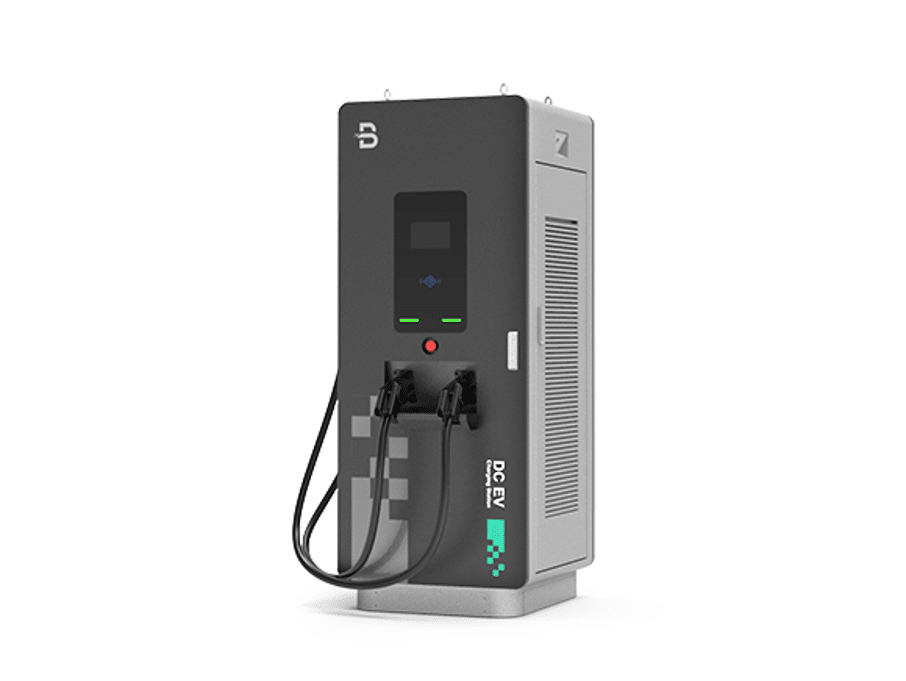
2. Floor-mounted 3 Guns DC EV Charger
Floor-mounted 3 Guns DC EV Charger is an enhanced floor-standing commercial EV charger capable of charging 3 vehicles simultaneously. It is ideal for medium-sized commercial fleets, delivering high-powered fast charging through an expanded configuration. With the addition of charging interfaces, it streamlines charging stations for mid-sized commercial depots and parking areas. Its key characteristics include:
- 82kW to 262kW charging power range. It supports a wide needs, from light to heavy-duty EVs
- Triple charging ports featuring 3 independent guns with optional CCS1, CCS2, Chademo, AC
- Large 9.1-inch screen allows for simple and convenient management
- Bright LCD screen with LED light provides a convenient session control experience
- OCPP 1.6J protocol to facilitate data transmission and APP ensures 24/7 monitor and control
- Durable design with an IP55 rating for robust indoor or sheltered outdoor performance
- Built-in electrical protections to prevent overcurrent and AC/DC leakage
- Compatible with all electric vehicles
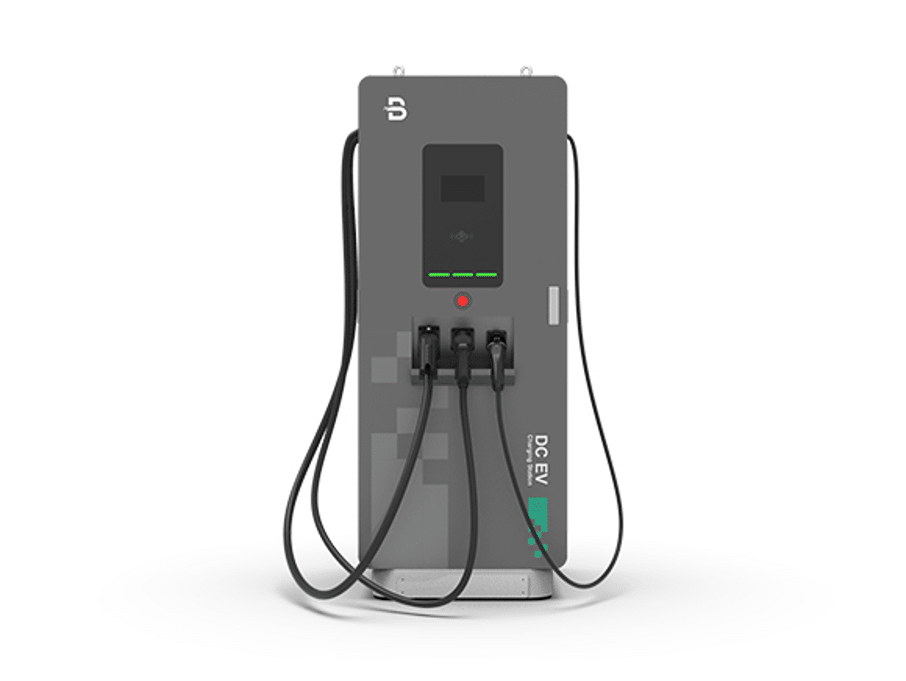
3. Wall-mounted DC EV Charger
The Wall-mounted DC EV Charger is one of BENY’s most compact charging solutions. It is suitable for locations with limited floor space. This is because its wall mountable design takes up a minimal area while delivering fast and reliable charging. It is ideal for charging single vehicles in areas with limited space, streamlining installation at offices, retail areas, and curbside applications. Its key features include the following:
- 20kW to 40kW charging power range, suitable for charging most EVs
- Single charging outlet with independent charging gun that utilizes the CCS2 connector standard
- 9.1-inch LCD screen allows for simple session control
- Wall-mounted design with vertical configuration to save significant floor area
- OCPP 1.6J supports seamless charging
- IP55 rating and durable design suitable for covered outdoor applications
- The product meets high international standards like CE and RoHS for electrical safety
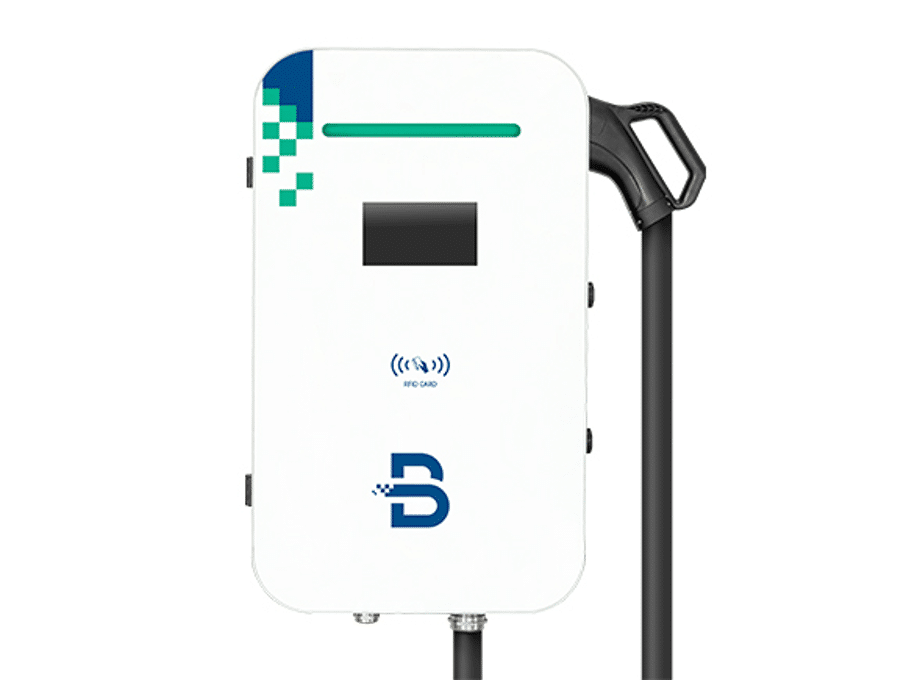
In addition to the unique characteristics, all these three products share many advanced features. These include:
- Modular Design: Key modular components can be easily swapped out for servicing, upgrades, or capacity increases over time to support rising electricity demands. The modular design minimizes downtime for maintenance or repairs.
- Protections: Sturdy enclosures shield internal hardware from AC/DC leakage, liquids, and particle ingress. Reinforced materials withstand impacts and direct weather exposure, allowing for robust performance even in extreme outdoor climates. Multi-layer protection defends against rain, snow, dust, accidental damage, and vandalism.
- Wi-Fi and 4G Connectivity: Built-in connectivity through EVBox BusinessLine enables constant remote monitoring of real-time data on energy usage, temperatures, errors, and more. It also facilitates online updates to ensure that the commercial EV charger always has the latest software. This connectivity also supports remote maintenance to allow immediate fault analysis without long-term delay.
- Universally Compatible: These commercial EV chargers are universally compatible with all electric vehicles. Furthermore, constant firmware updates to BENY’s EV chargers keep them compatible with new vehicle models.
- Integrated kWh meter: It facilitates accurate, easy measurements of the energy that EV charging is using.
- Customized Branding: BENY’s dependable OEM/ODM service allows clients to customize advanced commercial EV chargers to increase brand recognition.
BENY backs premium-grade products with strong aftersales support. All the above-listed commercial EV chargers come with a 12-month warranty. You can also optionally extend coverage terms through extended warranties and tailored service agreements. They provide technical support to resolve issues, further benefiting customers in the long-term use of their charging infrastructure. This combined function and protection establishes their solutions as a trusted investment in the transition to sustainable mobility.
Conclusion
The growing demand for commercial EV charging solutions worldwide presents a huge market opportunity for businesses. As urban people adopt electric vehicles at rising rates, installing safe and reliable high-powered charging stations on commercial venues not only supports the transition toward more sustainable urban transportation networks but also stands to directly boost popularity, traffic, and customer retention. Moreover, businesses can gain a valued competitive advantage among environmentally conscious consumer and client segments.
Established brands like BENY, with years of experience, continue innovating cutting-edge technologies that reliably charge this evolution. Their commercial electric vehicle chargers empower the growing number of cities, businesses, and drivers embracing electrical transportation. Their stable, high-power products and solutions meet the demands of public installation environments. Visit their website to learn more about this company or explore the diverse portfolio of commercial EV chargers.
